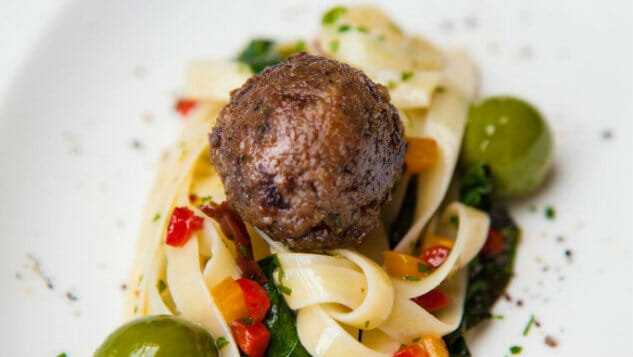The Future is Vegan, According to Star Trek
Photo courtesy of Memphis Meats
By the time humanity reaches Stardate 41249.3 (April 1, 2364 for non-Trekkies), animals will no longer be used for food. At least, that’s the story told by Star Trek, The Next Generation — and other incarnations of the famous show.
On the aforementioned date, Commander William T. Riker (the charming, mustachioed first officer to iconic Captain Jean Luc Picard) will have the following conversation with a group of rat-faced (literally) guests called the Anticans.
Riker: We no longer enslave animals for food purposes.
Badar N’D’D: But we have seen humans eat meat.
Riker: You’ve seen something as fresh and tasty as meat, but inorganically materialized, out of patterns used by our transporters.
The “meat” is made through what’s called a “replicator.” Members of the Star Trek universe need only ask the machine for any food item they want, and the dishes appear out of thin air.
Though there are many instances of humanoids eating meat in the various Star Trek series, Riker’s statement explains its origin. Then there are species like the Vulcans, longtime vegetarians, thanks to their nonviolent ethics.
In 2016, this concept may not be so far off. Companies across the world are using technology to develop humane, sustainable alternatives to animal agriculture — without forcing people to give up meat, dairy, or eggs altogether.
The Not Company, based in Chile, is using an artificial intelligence they’ve named Giuseppe to turn plant ingredients into animal products on the molecular level. According to the company, Giuseppe is programmed to be the smartest food scientist on earth, and thus far “he” has created NotMilk, NotMayo. NotYogurt, and NotCheese, which will soon be hitting shelves in Chile. Giuseppe utilizes ingredients including legumes and flowers to recreate the taste and consistency of animal products.
-

-

-

-

-

-

-

-

-

-

-

-

-

-

-

-

-

-

-

-

-

-

-

-

-

-

-

-

-

-

-

-

-

-

-

-

-

-

-

-








































